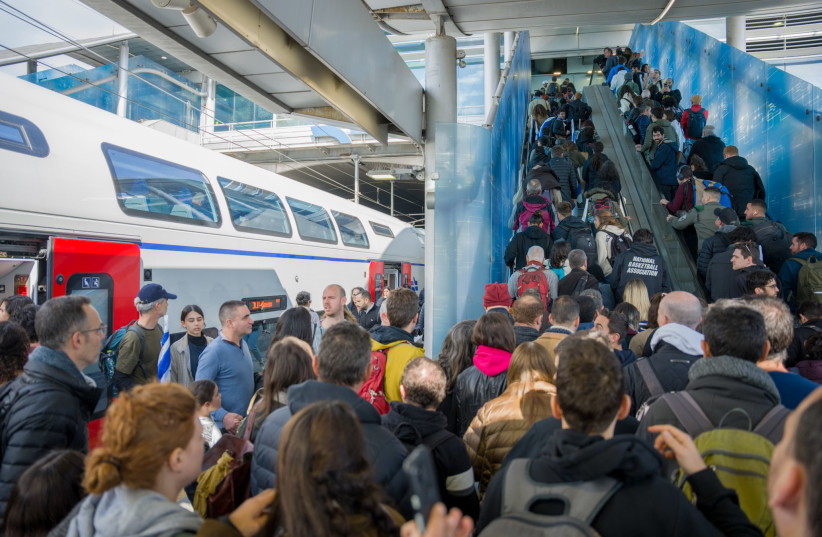Cinema City, at the edge of Jerusalem’s new government compound, was one of the big benefaciaries of Monday’s massive demonstration by opponents of the government’s judicial reform.
Usually a ghost town in the early afternoon, aside from seniors going to the movies and office workers grabbing a bite, the mall was packed with demonstrators fortifying themselves with snacks, lunch and bathroom breaks.
“I can’t keep up with the orders,” said Uzi, one of the workers behind the counter at McDonald’s, as customers crowded around the computerized ordering station for their Happy Meals.
On the second floor terrace, overlooking the Knesset, Yitzhak, a veteran Jerusalemite in his 70s, was observing the scene and taking photos with a sophisticated long-range lens camera.
“I’ve never seen anything like this,” he said, leaning over the railing. All the streets leading to the Knesset boasted steady streams of new arrivals – many of them out-of-towners marching from Yitzhak Navon train station and central bus station area – joining the thousands already gathered. Some began impromptu rhythmic chants of “De-mo-cra-ti-ya” as they slowly moved through the throngs.

President Herzog's impassioned pleas
A few hours earlier, a few hundred meters away, inside the Knesset, a different kind of democracy than the protesters were chanting about was on show. Amid a chaotic scene of shouting and disruption by opposition MKs, the Constitution, Law and Justice Committee approved the judicial overhaul bills for their first reading in the plenum at a later date.
President Isaac Herzog’s impassioned plea on Sunday night to halt the legislative process and work for a broad agreement based on the five principles he outlined, unfortunately failed to have an impact, at least for the time being. And the winds of compromise that he aspired to in his unprecedented appeal were nowhere to be felt on Monday, not in the Law Committee – and not on the streets.
Back outside Cinema City, a small group of government supporters stood on the sidewalk in a separate mini-demonstration. Their leader, with a loudhailer, criticized the protest and praised Prime Minister Benjamin Netanyahu. “They won the election and you lost. Get used to it,” he bellowed, as the masses drowned him out in boos.
Down below, walking along Hanassi Hashishi Street, the mood felt like a combination of a tailgate party, a soccer match and a rally. A wavy roof of flags covered the crowd, while other attendees sported posters with slogans ranging from “I have no other country” to “No democracy with occupation.”
Vuvuzelas and snare drums ricocheted in the air; friends finding each other in the crowd embraced each other, while others were on their phones giving directions to their location.
An occasional whiff of cannabis and an equally sparse sighting of a stray kippa among the well-behaved, overwhelmingly Ashkenazi-looking crowd, was the exception, not the rule.
As more protesters showed up, Cinema City became even busier, and so did McDonald’s. Uzi, who had been hoping for a break, resigned himself to working through the rush.
‘Hopefully tomorrow, things will go back to normal,” he said.
After 24 hours like this, however, for the country at large, that’s highly unlikely.
Rooftop Yitzhak’s observation of never witnessing something like this during his lifetime applies to more than the scene of Jerusalem’s streets being packed with humanity by citizens who care enough about their country to put their lives on hold for a day to show their patriotism and concern.
It could easily be referring to the tenuous, highly volatile atmosphere the country is experiencing as it enters uncharted territory filled with more potential peril than even the periods surrounding the disengagement and the assassination of Yitzhak Rabin. The question raised by Monday’s landmark events is whether there exists a roadmap to navigate an exit that won’t leave the country’s unity in ruins.
